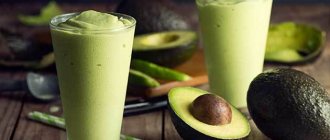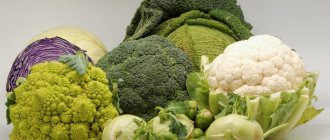The proper nutrition of the expectant mother during pregnancy depends on
proper formation of the fetus, as well as physical and emotional state after childbirth.
Vegetables and fruits are extremely beneficial during this period.
. They supply the body with essential vitamins and minerals, supply it with fiber, activate the intestines, and improve mood.
Bell peppers are no exception
. Fragrant and bright, it will help cope with toxicosis in the first trimester, create a supply of iron and give a surge of energy in the second, and relieve constipation and heaviness in the stomach in the third.
Pepper fruits are hollow, have thick, juicy walls and are brightly colored, which can be red, green, orange, yellow or purple.
When purchasing a quality vegetable, it is advisable to follow the following rules:
:
- The surface should be smooth, shiny, elastic, spring back when pressed, but not sticky, which may indicate that the pods have been treated with paraffin to increase shelf life.
- The color of fresh pepper is bright, without dark or whitish spots. A pale color means the product is expired or has been kept warm for a long time.
- The stalk (tail) of fresh pepper can only be green and elastic. If the tail is dried out, the fruit will most likely be black or rotten inside after cutting.
Pepper fruits are male (three-chambered) and female (four-chambered).
Male pods are harder and last longer. They are best consumed after heat treatment. Women's ones are sweet and juicy, ideal for making salads and smoothies.
You will have to refuse to purchase bell pepper if
him:
- there are cracks or dents on the surface;
- dry or rotten stalk;
- the skin is covered with plaque and dirt.
Also, you should not buy very large fruits (more than 200 g)
. In this case, growth stimulants were most likely used during cultivation.
How to choose sweet pepper:
The benefits of bell pepper during pregnancy
Bell peppers contain the substance capsaicin, which has a beneficial effect on the digestive system. Improving digestion is very important during pregnancy, because the growing uterus puts pressure on the intestines and other internal organs, causing unpleasant consequences: bloating, flatulence, constipation. To help the body, or rather the digestive tract, you need to add fiber to your diet in the form of fresh fruits and vegetables.
Bell peppers contain large amounts of vitamin C, which is necessary to support the immune system, which is weakened in expectant mothers. Regular consumption of fresh vegetables is a measure to prevent various colds and more.
The rich composition of this product makes it a natural antidepressant. With its help, you can put your nervous system in order, get rid of anxiety and bad mood, and improve your well-being.
Vitamins A, P, group B, sodium, magnesium, phosphorus, iodine, zinc and potassium are necessary to maintain the functioning of the mother’s body, as well as for the growth and development of the baby. All these beneficial substances have the following effects:
- improve the condition of skin, hair, nails, teeth;
- relieve acne and acne;
- strengthen blood vessels;
- improve vision;
- help get rid of stress and insomnia;
- remove waste and toxins from the body;
- prevent the development of atherosclerosis and thrombophlebitis;
- reduce cholesterol levels;
- relieve swelling;
- promote better absorption of iron.
Bell pepper increases appetite, which is often absent in pregnant women. Moreover, it is a low-calorie vegetable and can be eaten in desired quantities without worrying about weight gain.
For this reason, bell pepper is necessary in the diet of the expectant mother.
Bell pepper - the benefits and harm of a multi-colored vegetable
Many gourmets like delicious, juicy bell (sweet) peppers.
Its fruits are eaten fresh, cooked, and are often used in cosmetology and folk medicine. Many words of praise have been said about bell peppers. It is rightfully included in many of the most popular, healthy vegetables. Modern breeders have developed many varieties of this crop. In stores and on the market there is a wide selection of aromatic fruits of sweet peppers in red, green, orange, yellow colors. Scientists even managed to develop varieties with blue and purple skin. It is imperative to include bell pepper in your diet, the benefits and harms of which have now been thoroughly studied by scientists.
Historical reference
Many gardeners, for whom the benefits of bell pepper are obvious, do not even know that South America is considered the birthplace of this crop. Here peppers, growing as bushes, are perennials. Bell peppers were once brought to Europe by Columbus. It came to our country from Bulgaria, which is why it received the appropriate name.
What is the nutritional value of bell pepper?
It has long been proven that sweet peppers are a real source of vitamins.
Fresh bell peppers contain beneficial vitamins (A, B, C, E, P) in very significant quantities. Heat-treated fruits retain a sufficient concentration of valuable vitamins. It is noteworthy that the content of vitamin C (ascorbic acid) in sweet peppers is higher in comparison with the recognized “fruit champions” - lemon and black currant. The taste of bell peppers lacks the pronounced “sourness” characteristic of citrus fruits and berries.
To the question: “How much vitamin C is in bell pepper?” you can answer the following: “Approximately 128 mg / 100 g. product."
The fruits of sweet peppers are high in minerals: potassium, sodium, calcium, zinc, magnesium, phosphorus, silicon, iron, iodine. Low-calorie bell peppers (27 kcal / 100 g) are certainly included in their menu by adherents of a healthy diet and people trying to lose weight.
Beneficial features
When asking the question: what is the benefit of bell pepper, you need to pay attention to the high content of microelements and vitamins in it.
The minerals present in the fruits of sweet peppers help enrich the blood and have a positive effect on increasing the protective properties of the body and strengthening the immune system. The combination of ascorbic acid and vitamin P ensures strengthening and increasing the elasticity of the blood vessels of the circulatory system. A significant benefit of bell pepper for the body is the prevention of thrombosis and the development of atherosclerosis. The presence of this vegetable in the daily menu significantly reduces the risk of a possible stroke.
Bell pepper is extremely useful during pregnancy, since during this period there is a deterioration in the condition of bone tissue and hair. The high carotene content in sweet peppers stimulates hair growth, has a beneficial effect on the condition of nails and skin, and improves vision. It has been established that the use of bell pepper by a man affects the reduction of bald spots and prevents their appearance. Therefore, the usefulness of this vegetable for men is obvious.
Scientific studies on the beneficial properties of bell pepper indicate that eating the fruit helps cope with depression, mental disorders, and insomnia. The presence of vegetables in the menu allows you to restore strength and relieve muscle and nervous tension.
Doctors often recommend sweet peppers for diabetics. Due to the presence of antioxidants in it, blood thins and blood pressure decreases. The alkaloid capsaicin contained in fruits has a positive effect on the functioning of the pancreas and gastrointestinal tract.
When discussing the topic: “Bell pepper - beneficial properties,” people certainly pay attention to the ability of a fresh vegetable to stimulate and improve appetite. Eating a piece of fresh sweet pepper is guaranteed to make you want to eat. Not everyone considers this an advantage (especially those who are prone to obesity).
People who indulge in mental work should not give up sweet peppers, because they contain substances that have a positive effect on improving memory and concentration.
Methods of use
Bell pepper is a universal product that can be consumed in any form: raw, boiled, baked, stewed and even fried. There are no restrictions on cooking methods, but you need to understand that during heat treatment, a vegetable loses approximately 70% of its valuable microelements and vitamins, and therefore its beneficial properties.
The best way to consume it is fresh. The pepper can be carefully cut, seeded and used as a snack. The vegetable is also good in light vegetable salads and snacks.
Vegetable juice with the addition of freshly squeezed bell pepper juice is a storehouse of vitamins and nutrients. This drink can be consumed daily before bed or during lunch, but not on an empty stomach.
Potential harms and contraindications during pregnancy
Due to the high content of essential oils, pepper may cause an allergic reaction.
. Also, those who do not like their taste should not eat sweet pods.
The use of the product is contraindicated for pregnant women.
:
- liver and kidney diseases;
- gastritis and stomach ulcers;
- low blood pressure (hypotension);
- epilepsy.
Carefully
Sweet peppers should be eaten by those who limit themselves in food in order to maintain their figure. The vegetable awakens a strong appetite.
The healthiest pepper is fresh, without heat treatment.
. But even when baked or stewed, it retains many of its beneficial properties.
Ascorbic acid decomposes when heated, but vitamins B, K and rutin are retained by 60%.
Before use, the fruit must be separated from the stalk and cleared of seeds. To do this, the pod is cut lengthwise.
After cleaning, it is washed with warm water and then with cold water to preserve its crunchy properties.
If during pregnancy you want to eat this vegetable every day, then you should not deny yourself this in the absence of allergies and contraindications. In other cases, it is recommended to use it three times a week.
Daily norm
fresh pepper in the first trimester - 50-70 g, and in the second and third - 100-150.
It is advisable to eat stewed or baked peppers in combination with fish or meat in an amount of 100-120 g.
During pregnancy, it is necessary to limit, or better yet completely exclude, marinades and canned bell peppers from the diet. They can cause swelling.
The thermally processed product is best absorbed during lunch in combination with protein dishes.
Fresh peppers can be eaten at lunchtime
in the form of a salad, seasoned with a small amount of vegetable oil, and also for dinner, with cottage cheese or cottage cheese.
What is useful for expectant mothers
Bell pepper contains a large amount of vitamins and microelements. It is especially useful for pregnant women, as it can help eliminate depression, insomnia, nervous tension, high cholesterol, malfunction of the immune system and gastrointestinal tract, as well as remove waste and toxins from the body. In folk medicine, the fruit is used to prevent thrombophlebitis and atherosclerosis.
As for the composition, this vegetable contains a huge amount of vitamins C, B, A, P, calcium, iodine, magnesium, sodium salts, phosphorus, zinc, iron and potassium. Pepper is called a natural antidepressant, because it improves well-being. It also helps improve vision and vascular condition. If you consume the optimal amount of pepper throughout pregnancy, a woman will be able to get rid of brittle hair, nails, as well as acne and acne. The sweet fruit can be consumed by women before conception and throughout pregnancy. The vitamins and minerals it contains not only help organize the proper formation of the fetus, but also supply the required amount of nutrients to the mother’s body.
Why you shouldn't eat spicy food during pregnancy
Excessive consumption of spicy foods can cause insomnia, body tremors, heartburn, intestinal colic and diarrhea. Therefore, you should approach the intake of spicy foods with extreme caution.
In the early stages
During the first months of pregnancy, eating hot foods is not prohibited. The only condition is not to overdo it. By consuming them in normal quantities, you can reduce the manifestations of toxicosis characteristic of the first trimester. If spicy foods become the basis of the diet, toxicosis will only intensify. Consequently, the pregnant woman’s well-being will deteriorate significantly, which will also affect the child.
During pregnancy in the second trimester, spicy foods are also not taboo. However, given that during this period the child begins to actively develop, it is recommended to consult a doctor. You should consume spicy foods only based on the well-being of the expectant mother and the condition of the fetus in the womb.
Contraindications and harm
Bell peppers have certain benefits during pregnancy, but there are also harms. Unfortunately, it is a low-calorie product. It can also increase hunger. Therefore, it should not be consumed by those wishing to lose weight.
It is also not recommended to use pepper for those girls who have high acidity, hypertension, gastritis or diseases of the gastrointestinal tract, kidneys or liver. These diseases can worsen when eating vegetables.
Pregnancy and black pepper
Black pepper is considered one of the popular spices; it adds an unforgettable taste to any dish.
One of the properties of this seasoning is to improve digestion and improve well-being, due to which the body increases its tone.
But black pepper has one more property: it can increase appetite in small quantities, and can provoke severe thirst (in case of too much seasoning).
During pregnancy, this can lead to swelling and retention of excess water in the body.
Also, black pepper during pregnancy can provoke the appearance of a disease such as gestosis (impaired kidney function). To prevent this from happening, you need to remember that it is better to use it in small quantities and in the form of peas.
This way the dish will acquire its flavor, and you will avoid unpleasant consequences.
118
How to choose the right one when purchasing
Bell peppers should only be bought fresh, especially during pregnancy. Next, you will learn how to choose a vegetable.
- the surface should be slightly shiny, smooth and without damage. Any damage can lead to rapid rotting of the fruit and be a source of proliferation of harmful bacteria;
- the tail of the vegetable should be green, as this proves that the product is really fresh;
- the fruit should be elastic and juicy;
- The color can be any (orange, yellow, green or red), but there should be no stains. Green indicates that it is not yet ripe;
- the skin should be dry;
- there should be no plaque on the surface of the vegetable.
- there are mechanical damages and cracks;
- the stalk is missing;
- wrinkled peel;
- the slightest signs of rotting;
- the fruit is too large, the peel is very shiny (means that the vegetable has been processed);
- plaque on the surface;
- inclusions (these are signs of infection or the process of rotting).
Precautionary measures
Now it’s worth discussing whether bell peppers can be eaten by pregnant women. At this time, the woman’s body weakens, and the load on the organs increases. And the child requires a lot of useful substances. If you regularly consume the vegetable, a pregnant woman will be able to get rid of cramps, swelling, colds, high or low blood pressure, hair loss, as well as a constant feeling of fatigue. As for precautionary measures, it is best to heat treat a store-bought product. Yes, you will lose vitamins, but this will help prevent intestinal irritation, heartburn or belching. However, it may become a forbidden product for you. The fact is that pregnant women may develop various allergies to foods that women had not noticed before. If you experience a rash or redness after eating bell pepper, it is best to exclude the product from your diet.
Useful or harmful - how to understand?
Most of us love bell peppers because of their unusual taste and nothing more. It is not like all the others, and in dishes it gives a pleasant aftertaste and luxurious aroma. But only nutritionists can say with confidence about the beneficial properties of this unusual vegetable.
The fact is that the substance capsicin contained in it (it is what gives pepper its taste and smell) is a kind of storehouse of useful minerals and a natural antioxidant. It is enough to eat fresh bell pepper every day, and the result will not take long to arrive. This vegetable is especially recommended for expectant mothers, as it has a beneficial effect on the gastrointestinal tract, cleansing the body of waste and toxins.
The second advantage of bell pepper is increasing immunity through the same capsicin. This property can be very useful during pregnancy, when very few vitamins and useful elements remain in the body to maintain a stable level of the immune system.
Moreover, bell pepper will help get rid of acne, pimples, brittle hair and nails, since its juice contains a large amount of calcium, as well as vitamins A, C, B, magnesium, potassium, zinc, iodine and many others.
Like any natural product, bell pepper has its drawbacks. For example, it is not recommended for pregnant women suffering from gastritis and chronic kidney and liver diseases. This can lead to both an increase in the disease itself and its transmission to the baby.
Heat-treated bell peppers are generally not recommended for pregnant women, since, firstly, they lose their beneficial properties, and secondly, they can cause fetal defects due to the presence of chemical elements in the juice.
Finally, I would like to note the fact that healthy, proper nutrition and the use of a complex of vitamins are the key to good health during pregnancy and the birth of a healthy baby.
For stable functioning, the body requires a correctly selected balance of vitamins. This is what is necessary for the full development of a pregnant woman’s unborn baby.
The presence of symptoms such as fatigue during pregnancy, mood swings, dizziness and drowsiness requires your attention. Such symptoms occur with vitamin deficiency. You can get rid of it without the intervention of doctors and the use of medications, and bell pepper will help us with this.
In what form is it better to eat, what can be done and what is combined with
During pregnancy, both in early and late stages, bell peppers can be eaten fresh, most importantly - in moderation. It is recommended to eat up to two fruits per day to replenish the supply of vitamins and minerals. It is also recommended to make vegetable juice by adding bell pepper to it. It quenches thirst no worse than water and replenishes the body with useful substances. You can also prepare stuffed peppers with meat by adding zucchini. The fruit goes well with many other foods, but it is best to add pepper to fresh salads, especially in the summer. It goes well with tomatoes, cucumbers, cabbage, seafood, meat, any side dish, as well as other vegetables. Pepper is a unique product that can be consumed during pregnancy. The main thing is to choose the right fruit on the counter and prepare it for consumption.
Interesting traditional medicine recipes
To make a rejuvenating mask from bell pepper, you need to grate the vegetable on a fine grater. The resulting pulp is mixed with cosmetic cream. The mask is applied to the face, after 30 minutes it is washed off with warm water. A cosmetic product made from bell pepper helps eliminate age spots that often appear during pregnancy and improves complexion. It allows you to smooth out small irregularities on the skin.
If you have pain in the stomach, you can use this useful recipe:
- To prepare the product, vegetables such as carrots, spinach, and bell pepper are taken.
- The juice is carefully squeezed out of the above products.
- You need to mix the juice of bell pepper, spinach and carrots in equal proportions.
A pregnant woman is recommended to take 30 ml of the product twice a day. Treatment is continued until the discomfort in the abdominal area disappears.
His Highness – bell pepper
Red, yellow, orange, green and even purple, this appetizing beauty of various sizes is a regular vegetable product in many supermarkets.
Its name suggests that it is the brainchild of Bulgarian breeders , who put a lot of work into turning an ordinary pod crop, growing in America, Colombia and Mexico, into a multi-colored giant.
Sweet, juicy and meaty - it just begs to be added to the basket of customers who are well aware of not only its excellent taste, but are also aware of the large amount of vitamins and minerals it contains.
Pregnant women do not avoid it either. Is it useful for expectant mothers, and in what quantities can they use it? Let's figure it out.
Bell pepper - “Live Healthy!” program
What can cause severe constipation during pregnancy and how to get rid of it without harm to the expectant mother and her baby? Find answers to your questions in this article.
Chimes during pregnancy: instructions and dosage - in this article.
Sweet
This vegetable is a type of bitter capsicum, and therefore has the same properties as its ancestor. But sweet peppers contain capsaicin in smaller quantities, so the fruits do not have a burning bitter taste. The salad product is the creation of breeders who have achieved a high content of the healing properties of the fruit.
Benefits of bell pepper for pregnant women:
- the high presence of vitamin C in the product (6 times higher than in citrus fruits) makes peppers indispensable for increasing immunity, which is so necessary for the expectant mother and her baby;
- ascorbic acid helps to better absorb other vitamins that make up the fruit, as well as mineral salts and organic acids;
- pectins, fiber and starch have a positive effect on the functioning of the gastrointestinal tract;
- fruits introduced into the diet fresh prevent complications during pregnancy and facilitate childbirth;
- bell pepper heals blood vessels, helping to avoid many diseases;
- hematopoietic properties will prevent the development of anemia in a pregnant woman (which often happens during an “interesting situation”).
Bell pepper for pregnant women has the same effects as bitter pepper - anti-cold, antibactericidal, diuretic, sugar-lowering. The product is also credited with antitumor properties. The sweet fruit is especially indispensable for women living in regions with unfavorable radiological conditions.
The vegetable is more useful when fresh - after heat treatment, the fruits lose more than half of their healing properties and become simply a tasty ingredient in dishes. Those women whose pregnancy coincided with the summer-autumn season are lucky in this regard.
But in winter and spring you have to be content with what is on sale. Supermarket shelves attract with their colorful abundance - shoppers are attracted by their appearance to green, yellow, and red bell peppers. But these fruits are grown in greenhouses, where various chemicals are used to improve the presentation of the product.
Often, the female body itself knows what is good for it and gives signals in the form of desires. If you want something hot and spicy, you can afford it in small doses (when there are no contraindications). The Bulgarian vegetable should always be in the diet, but even here one should take into account the negative impact of the product on some organs.
Sweet peppers are used in the recipes of a large number of culinary delights; they perfectly highlight the taste of meat dishes and go well with almost everything. Do you know that eating bell peppers is not only tasty, but also very healthy? This article will tell you why bell pepper is useful and why it is harmful.
Bell pepper during pregnancy
Its components include such useful substances as:
- Vitamins belonging to the groups: A, B, C, E, K and P. Only vitamin B group contains more than 5 elements that stimulate the functioning of the human cardiac and immune systems. The amount of vitamins A, K and C is several times higher than their content in carrots, citrus fruits and currants. At the same time, the % of sugar in it is significantly lower than in the indicated products.
Minerals represent a significant part of the periodic table. They are present in the form of 14 items, the main ones being: magnesium, calcium, potassium, iron and others. This mineral richness ensures the stability of the functioning of many important human organs and systems, including strengthening: blood vessels, muscles, bones, hair, teeth. Improves vision.
Beneficial properties for pregnant women
Intrauterine development lasts 9 months. This period is divided into three trimesters.
Nutrition in each of them depends on the well-being of the expectant mother and the needs of the fetus.
First trimester
During this period, the child’s nervous and cardiovascular system is formed. A pregnant woman may develop toxicosis and change her eating habits
.
In the first three months, the expectant mother's immunity decreases. This is provided by nature in order to avoid fetal rejection.
It turns out that it is at this time that the body of a woman and child is very vulnerable. Fresh bell peppers in the first trimester can help:
- get rid of toxicosis and drowsiness;
- remove waste and toxins from the body;
- increase the body's resistance to infections due to the high content of vitamin C and rutin.
High content of B vitamins in peppers
will allow a pregnant woman to stabilize her psycho-emotional state and ensure the fetus has the correct formation of the nervous system and heart.
Second
During these three months, the fetus actively forms bone tissue and teeth, and the woman’s body creates an iron reserve in the liver to prevent the development of postpartum anemia.
Calcium, iron, as well as copper and molybdenum contained in bell peppers will help replenish the supply of these substances in the body, having a beneficial effect on the metabolism of mother and child.
Third
In the last three months, intrauterine development of the fetus is completed. Only muscle and lung tissues actively develop, preparing for the birth process.
For a woman, this is a rather difficult period when her back may hurt, her legs and arms may swell due to the high load on her kidneys, and intestinal activity may decrease (constipation).
During this period, sweet peppers are capable of:
- relieve swelling due to the high potassium content;
- activate intestinal motility;
- reduce high blood pressure;
- cheer up.
The product is useful throughout pregnancy, but in the absence of contraindications for use.
Methods of use
The taste of this wonderful plant does not deteriorate when preparing stews, gyuvecha, and vegetable casseroles from it.
Peppers are delicious baked with meat on a grater or in the oven, as well as added to meat, fish, and potato dishes.
Wonderful caviar made from vegetables and bell peppers . It is also amazing fried. To do this, just place it in the oven until the skin turns golden brown.
All these dishes are appetizing and completely harmless for women preparing for motherhood.
Long time acquaintance with rich history
He is like a box with a secret. The more you learn about the properties and history of this vegetable, the more you want to figure out where the legends end and practical benefits begin. Not only its taste is valued, but also its medicinal and cosmetic properties.
The history of bell pepper goes back 9 thousand years, where it grew freely in North and South America. It is believed that the vegetable came to Europe with Columbus, who appreciated its taste and brought the seeds of the plant with him.
The guest did not feel very comfortable in our latitudes, and Bulgarian breeders had to work hard to develop varieties that were resistant to the climate and gave a good harvest. As a result, fruits of different colors have now appeared, with a rich, rich taste and a surprisingly appetizing appearance. You just want to bite into a large shiny pepper, forgetting about everything in the world. However, such a thoughtless attitude towards products is an unaffordable luxury for a pregnant woman; her sanity and caution should be enough for two. Fortunately, concerns do not apply to bell peppers.
Its benefit lies in its rich composition, which includes:
- vitamins of group B, C, A, E, PP;
- beta - carotene;
- choline;
- copper;
- manganese;
- potassium;
- minerals;
- iron.
Surprisingly, it was this vegetable, completely devoid of sour taste, that became the leader in the content of ascorbic acid, or vitamin C.
cucumbers during pregnancy









